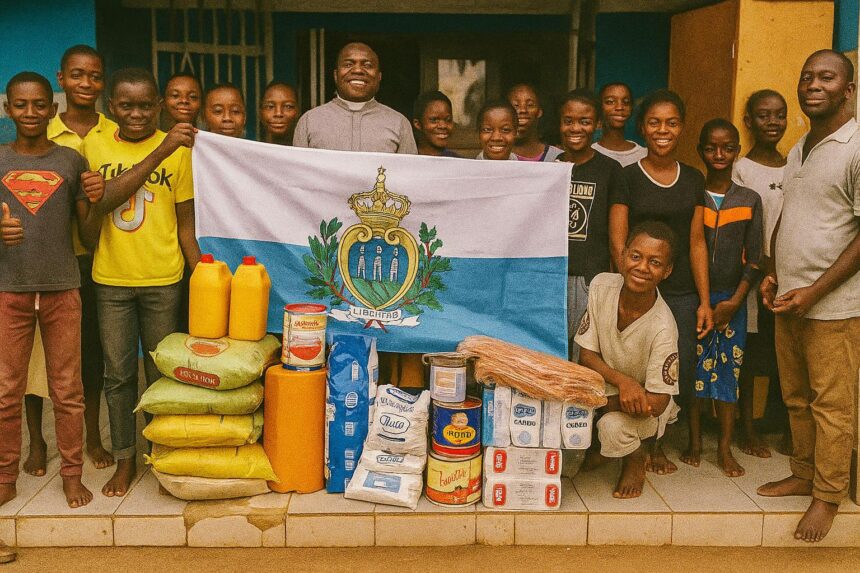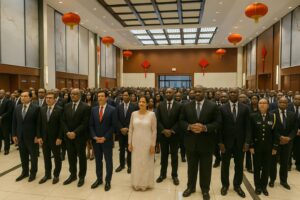Microstate Diplomacy Meets Local Realities
In the discrete theatre of international cooperation, the Republic of San Marino has mastered the art of precision strikes: limited in territory yet ample in intent, the enclave is quietly recalibrating soft-power equations far beyond the Apennines. Its consulate in Pointe-Noire has become an unlikely but increasingly active vector of engagement with the Congolese civil sphere, particularly through sustained support to the Association Maison du Cœur-Amis du Congo, better known by its acronym AMACO. The relationship illustrates how a microstate, often typecast as a diplomatic spectator, can generate outsized developmental footprints while remaining consonant with Brazzaville’s national policies on social inclusion and youth empowerment.
AMACO’s Multifaceted Social Blueprint
Founded under the French 1901 associative statute and directed by Abbé Ghislain Ngamouna, AMACO operates in Kingoué, at the northern fringe of Bouenza province. The organisation combines an orphanage, primary and lower-secondary schooling, a vocational trades centre, a modest agrarian plot, an artisan gallery and a nascent digital library. With twenty-five resident children—both Autochthonous and Bantu—its model prioritises holistic human capital formation aligned with Congo’s National Development Plan 2022-2026 (Ministry of Planning, 2022). Classroom instruction is interlaced with mentoring in apiculture, culinary service and artistic curation, practices that the Congolese Ministry of Social Affairs has repeatedly identified as catalytic for rural livelihoods (Official Bulletin, 2023). Unlimited internet access, secured through a partnership with a private telecom provider, further situates AMACO on the frontier of blended learning strategies promoted by UNESCO for francophone Africa (UNESCO, 2023).
Apiculture as Development Catalyst
In September 2024 the San Marinese consul donated fifty beehives to AMACO, multiplying the association’s apiary capacity more than sixfold. The timing was propitious: global honey prices have climbed by eighteen per cent since 2021 owing to climate-induced supply contractions (FAO Commodity Brief, 2024). Revenue from honey, propolis and wax already offsets a share of tuition, uniforms and health checks for the residents. Abbé Ngamouna spoke of a ‘dreamt-of expansion made tangible overnight’, crediting the consul for listening to grass-roots priorities rather than imposing template solutions. Sectoral analysts regard small-scale apiculture as an environmentally neutral, gender-inclusive income stream, a view echoed in the World Bank’s rural diversification note on Congo (World Bank, 2024).
Hydro-Social Infrastructure and Food Security
Material solidarity from San Marino did not begin with the beehives. A potable-water pump installed in 2022 extinguished chronic dependence on seasonal wells, enhancing sanitation indicators in line with UNICEF’s WASH benchmarks for Bouenza (UNICEF, 2023). Throughout 2025, consignments of rice, cooking oil and basic pharmaceuticals buttressed household food security during a period when domestic fuel price adjustments briefly inflated transport-related food costs (Congo Statistics Directorate, 2025). The micro-donations, though modest in fiscal terms, have proven strategically timed and context-sensitive, reflecting a growing doctrine in humanitarian circles that agility can rival scale in efficacy.
Diplomatic Resonance Beyond Symbolism
The bilateral rapport rests on an institutional architecture still in its adolescence. A memorandum of understanding signed at United Nations headquarters on 27 September 2018 created a formal channel, subsequently reinforced by Brazzaville’s appointment of its inaugural ambassador to San Marino on 9 February 2024. Officials in the Congolese Ministry of Foreign Affairs describe the exchange as ‘laboratory diplomacy’, an arena where experimental partnership modalities can be tested before replication with larger states. For San Marino, whose per-capita GDP hovers near forty-four thousand euros, the alliance offers a tangible development portfolio that compliments its branding in sustainable tourism and biotechnology (San Marino Government Report, 2024). Crucially, the initiative dovetails with President Denis Sassou Nguesso’s emphasis on empowering rural youth as articulated in his 2021-2026 social contract, thus avoiding the frictions that sometimes shadow external assistance.
Navigating Future Convergences
As AMACO contemplates scaling its vocational centre to include refrigeration engineering and digital coding, discussions are under way for a tripartite accord involving San Marino’s University Research Centre, a Congolese technical institute and the NGO itself. The blueprint envisages remote mentoring, equipment grants and exchange visits—mechanisms that align with African Union recommendations on diaspora-enabled micro-scholarships (AU Policy Brief, 2024). Stakeholders also explore carbon-offset apiculture schemes, capitalising on the microstate’s legislative predisposition to green finance. In a global environment where development aid often succumbs to transactional fatigue, the San Marino–AMACO narrative underscores how calibrated, empathetic diplomacy can translate into durable, community-rooted dividends.




















